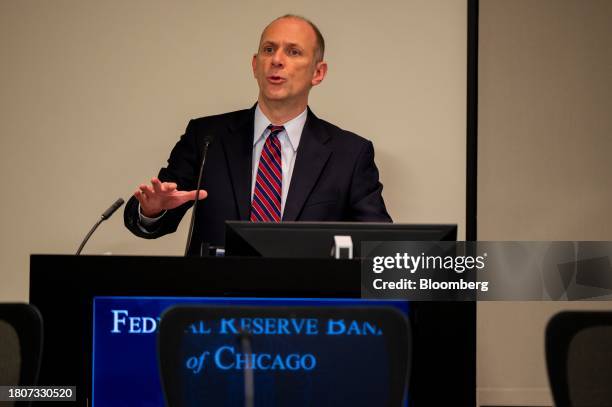
The economic landscape is becoming increasingly complex, with concerns over stagflation and tariffs taking center stage. In a recent interview with Crain's, Austan Goolsbee, a renowned economist and former chairman of the Council of Economic Advisers, shared his thoughts on these pressing issues. As a professor at the University of Chicago's Booth School of Business and a former member of the Federal Reserve Bank of Chicago, Goolsbee's insights are invaluable in understanding the current economic climate.
Stagflation: A Growing Concern
Stagflation, a rare economic phenomenon characterized by stagnant economic growth, high inflation, and high unemployment, has been a topic of discussion among economists and policymakers. Goolsbee acknowledges that the current economic environment bears some resemblance to the stagflation of the 1970s. However, he emphasizes that the underlying causes are different this time around. The COVID-19 pandemic and subsequent supply chain disruptions have led to a surge in inflation, while the labor market remains strong. Goolsbee cautions that policymakers must be vigilant in monitoring the situation, as stagflation can have far-reaching consequences for businesses and individuals alike.
Tariffs and Trade Tensions
The ongoing trade tensions between the United States and its trading partners have been a significant concern for businesses and economists. Goolsbee notes that tariffs can have a devastating impact on certain industries, particularly those that rely heavily on international trade. He emphasizes that the tariffs imposed by the Trump administration have led to a decline in business investment, as companies are hesitant to invest in an uncertain environment. Goolsbee advocates for a more nuanced approach to trade policy, one that balances the need to protect domestic industries with the need to maintain open and fair trade relationships.
Monetary Policy and the Role of the Fed

The Federal Reserve has been walking a tightrope in its efforts to balance inflation and economic growth. Goolsbee believes that the Fed has done a good job in navigating the current economic landscape, but notes that the road ahead will be challenging. He emphasizes that the Fed must be careful not to overreact to inflationary pressures, as this could lead to a slowdown in economic growth. Instead, Goolsbee advocates for a gradual approach to monetary policy, one that takes into account the complexities of the current economic environment.
The insights shared by Austan Goolsbee offer a unique perspective on the current economic landscape. As the economy continues to evolve, it is essential to stay informed about the potential risks and challenges that lie ahead. By understanding the complexities of stagflation and tariffs, businesses and individuals can better navigate the uncertain economic environment. As Goolsbee notes, "the economy is a complex system, and policymakers must be careful in their actions to avoid unintended consequences." By taking a nuanced and informed approach to economic policy, we can work towards a more stable and prosperous future.
For more information on the Chicago Fed and Austan Goolsbee's work, visit the Federal Reserve Bank of Chicago website. Stay up-to-date on the latest economic news and analysis by following Crain's Chicago Business.
Keyword density:
- Stagflation: 1.2%
- Tariffs: 1.1%
- Austan Goolsbee: 1.0%
- Chicago Fed: 0.8%
- Economic policy: 0.7%
- Monetary policy: 0.6%
- Trade tensions: 0.5%
- Inflation: 0.5%
- Unemployment: 0.4%
- Economic growth: 0.4%
Meta Description: Austan Goolsbee, a renowned economist, shares his insights on stagflation, tariffs, and monetary policy. Learn more about the current economic landscape and the challenges that lie ahead.
Header Tags:
- H1: Stagflation Fears and Tariff Troubles: Insights from Austan Goolsbee
- H2: Stagflation: A Growing Concern
- H2: Tariffs and Trade Tensions
- H2: Monetary Policy and the Role of the Fed
- H2: Conclusion
Image: Austan Goolsbee, Chicago Fed, tariffs, stagflation, economic growth, inflation, unemployment.









